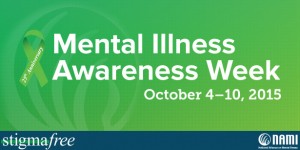 by William Schultz, Doctoral Student, Minnesota School of Professional Psychology
by William Schultz, Doctoral Student, Minnesota School of Professional Psychology
The first full week of October (October 4th – 10th) is “Mental Illness Awareness Week” (MIAW). The primary purposes of MIAW are to fight stigma, provide educational material to the public, and to push for better mental health care. The National Alliance on Mental Illness (NAMI) has energetically promoted MIAW. This isn’t surprising since NAMI’s goals are to fight stigma, raise awareness, and provide education about “mental illness” to mental health patients, the public, and policy makers (NAMI, 2015a). But NAMI’s efforts may, in fact, be making the matter worse.
No doubt the stated NAMI goals are important. Millions of individuals suffer from significant emotional and mental distress (often called mental illness or psychological disorders – terminology I dislike but will use for clarity in what follows). Lack of awareness, as well as stigma surrounding psychological disorders, contribute to these individuals not seeking the assistance of mental health professionals (Bharadwaj, Pai, & Suziedeltye, 2015). This is unfortunate because many forms of psychological disorders can be significantly diminished through treatment. For example, Khan, Faucett, Lichtenberg, Kirsch, and Brown (2012) conducted a meta-analysis of hundreds of studies. Their meta-analysis found that the depressive symptoms of patients who participated in psychotherapy decreased by about 50%. On the other hand, the depressive symptoms of patients on a waiting list only decreased by about 10%. This finding led Khan et al. (2012) to argue “engaging in treatment is critical to improvement” (p. 9).
Since treatment is important, and reducing stigma is thought to increase treatment seeking, it’s not surprising that for some time mental health advocacy organizations have done their best to try to reduce stigma. But NAMI's misstep is to promote a biological etiology of psychological disorders (Corrigan & Watson, 2004). The underlying idea behind this approach is that there will be less blame associated with psychological disorders if patients and the public conceptualize psychological disorders as biological illnesses (Corrigan et al., 2000). For example, if biological etiologies of depression were embraced, the public may view someone experiencing depression as chemically-imbalanced or genetically predisposed instead of weak willed or lazy. It’s thought that stigma can be diminished by decreasing or removing the element of moral blame associated with being weak willed or lazy.
NAMI has a long history of ostensibly fighting stigma by claiming that psychological disorders are a biological, medical illness like cancer or diabetes (Angermeyer, Holzinger, Carta, & Schomerus, 2011; Deacon, 2013; Kvaale, Haslam, & Gottdiener, 2013; Lebowitz & Ahn, 2012). For example, a study by University of Michigan researchers found that NAMI’s web site information about depression emphasized biological etiologies (Hansell et al., 2011). While depression treatment centers, universities, and government websites generally provided approximately proportional descriptions of biological and psychosocial causes of depression, NAMI’s website – like pharmaceutical company websites -- focused much more on biological causes. While treatment centers, universities, and governments provided balanced explanations or even explanations that emphasized psychosocial causes, “The NAMI Website, for example, showed a 9:1 ratio in biological to psychosocial content about depression” (Hansell et al., 2011, p. 387). This sort of finding probably goes a far way of explaining why the first treatment option listed for the majority of the mental health conditions on NAMI’s “Fact Sheet Library” is medication (NAMI, 2015b) – though Hansell et al. (2011) suggested that the emphasis on biological etiologies “may in part reflect NAMI’s close relationship with pharmaceutical companies” (p. 387).
If an accurate reflection of reality, NAMIs approach seems coherent. That is, if emphasizing biological etiologies can diminish stigma and diminishing stigma can lead to improved treatment outcomes, then NAMI’s approach seems to have some plausibility.
However, NAMI’s perspective on psychological disorders is troublesome for at least three reasons:
First, biological etiologies of psychological disorders do not necessarily decrease stigma. In fact, a large body of evidence suggests that biological etiologies of mental illness can increase stigma associated with many psychological disorders (Schomerus, Matschinger, & Angermeyer, 2014; Speerforck, Schomerus, Pruess, & Angermeyer, 2014). One prominent explanation for this finding is that although biological etiologies may diminish moral blame, they increase the perceived dangerousness and difference of those experiencing mental illness.
Second, emphasizing biological etiologies implies that biological interventions (e.g., medications) are the preferred treatment (Deacon, 2013; Kemp, J. J., Lickel, J. J., & Deacon, 2014; Read, Cartwright, Gibson, Shiels, & Magliano, 2015). This is concerning because substantial evidence suggests that very often medications do not provide significantly superior treatment benefits for psychological disorders when compared to psychotherapy (Cuijpers, Sijbrandij, Koole, Andersson, Beekman, & Reynolds, 2013; Harrow, Jobe, & Faull, 2012; Khan et al., 2012) and medications have a long list of negative effects, some of them very serious (Andrews, Thomson, Amstadter, & Neale, 2012; Kirsch, 2014; Moncrieff, 2009; Moncrieff 2013).
Third, emphasizing biological etiologies can have significant clinical impacts. Individuals who endorse a primarily or exclusively biological etiology of psychological disorders have increased prognostic pessimism, probably because they’ve accepted an essentialist account of their identity which leads them to believe they have little ability to modify their subjective experience (Lebowitz, 2014; Schultz, 2016). Increased prognostic pessimism is an important clinical factor because individuals’ expectancies for improvement is a significant contributor to their actual improvement. Individuals who expect to do better, do better (Constantino, 2012).
To sum up, MIAW has a great chance to educate the public about the prevalence, causes, and treatment options for psychological disorders. I hope this short piece shows that the perspective adopted by NAMI is not comprehensive and probably harmful to clients.
But what about stigma? Well, as I wrote previously: “… a biological understanding of psychological disorders is not the only way to combat stigma. We can adopt a compassionate attitude toward those struggling with [psychological disorders] even if we don’t also accept the view that their [psychological disorders are] biologically determined. For example, individuals [with psychological disorders] may simply not know other ways to manage their emotions or they may be dealing with a variety of stressors which overwhelm their ability to cope in a more adaptive way. Neither of these views suggests that the proper attitude is to judge and chastise individuals…as being weak willed” (Schultz, 2015).
References
Andrews, P. W., Thomson Jr, J. A., Amstadter, A., & Neale, M. C. (2012). Primum Non Nocere: An Evolutionary Analysis of Whether Antidepressants Do More Harm than Good. Frontiers in Psychology, 3, 117.
Angermeyer, M. C., Holzinger, A., Carta, M. G., & Schomerus, G. (2011). Biogenetic explanations and public acceptance of mental illness: systematic review of population studies. The British Journal of Psychiatry, 199(5), 367-372.
Bharadwaj, P., Pai, M. M., & Suziedelyte, A. (2015). Mental Health Stigma (No. w21240). National Bureau of Economic Research.
Constantino, M. J. (2012). Believing is seeing: an evolving research program on patients' psychotherapy expectations. Psychotherapy Research, 22(2), 127-138.
Corrigan, P. W., River, L. P., Lundin, R. K., Wasowski, K. U., Campion, J., Mathisen, J., Goldstein, H., Bergman, M., Gagnon, C., & Kubiak, M. A. (2000). Stigmatizing attributions about mental illness. Journal of Community Psychology, 28(1), 91-102.
Corrigan, P. W., & Watson, A. C. (2004). At issue: Stop the stigma: call mental illness a brain disease. Schizophrenia Bulletin, 30(3), 477-479.
Cuijpers, P., Sijbrandij, M., Koole, S. L., Andersson, G., Beekman, A. T., & Reynolds, C. F. (2013). The efficacy of psychotherapy and pharmacotherapy in treating depressive and anxiety disorders: a meta‐analysis of direct comparisons. World Psychiatry, 12(2), 137-148.
Deacon, B. J. (2013). The biomedical model of mental disorder: A critical analysis of its validity, utility, and effects on psychotherapy research. Clinical Psychology Review, 33(7), 846-861.
Hansell, J., Bailin, A. P., Franke, K. A., Kraft, J. M., Wu, H. Y., Dolsen, M. R., Harley, V. S., & Kazi, N. F. (2011). Conceptually sound thinking about depression: An Internet survey and its implications. Professional Psychology: Research and Practice, 42(5), 382-390.
Harrow, M., Jobe, T. H., & Faull, R. N. (2012). Do all schizophrenia patients need antipsychotic treatment continuously throughout their lifetime? A 20-year longitudinal study. Psychological Medicine, 42(10), 2145-2155.
Kemp, J. J., Lickel, J. J., & Deacon, B. J. (2014). Effects of a chemical imbalance causal explanation on individuals' perceptions of their depressive symptoms. Behaviour Research and Therapy, 56, 47-52.
Khan, A., Faucett, J., Lichtenberg, P., Kirsch, I., & Brown, W. A. (2012). A systematic review of comparative efficacy of treatments and controls for depression. PloS one, 7(7), e41778.
Kvaale, E. P., Haslam, N., & Gottdiener, W. H. (2013). The ‘side effects’ of medicalization: A meta-analytic review of how biogenetic explanations affect stigma. Clinical Psychology Review, 33(6), 782-794.
Lebowitz, M. S. (2014). Biological conceptualizations of mental disorders among affected individuals: A review of correlates and consequences. Clinical Psychology: Science and Practice, 21(1), 67-83.
Lebowitz, M. S., & Ahn, W. K. (2012). Combining biomedical accounts of mental disorders with treatability information to reduce mental illness stigma. Psychiatric Services, 63(5), 496-499.
Moncrieff, J. (2008). The myth of the chemical cure: A critique of psychiatric drug treatment. New York, NY: Palgrave Macmillan.
Moncrieff, J. (2013). The bitterest pills: The troubling story of antipsychotic drugs. New York, NY: Palgrave Macmillan.
National Alliance on Mental Illness. (2015a). About NAMI. Retrieved from https://www.nami.org/About-NAMI
National Alliance on Mental Illness. (2015b). Fact sheet library. Retrieved from https://www.nami.org/Learn-More/Fact-Sheet-Library
Read, J., Cartwright, C., Gibson, K., Shiels, C., & Magliano, L. (2015). Beliefs of people taking antidepressants about the causes of their own depression. Journal of Affective Disorders, 174, 150-156.
Schomerus, G., Matschinger, H., & Angermeyer, M. C. (2014). Causal beliefs of the public and social acceptance of persons with mental illness: a comparative analysis of schizophrenia, depression and alcohol dependence. Psychological Medicine, 44(02), 303-314.
Schultz, W. E. R. (2015) Binge eating and genetics. Retrieved from https://www.madinamerica.com/2015/08/binge-eating-and-genetics/
Schultz, W. E. R. (2016). Neuroessentialism: Theoretical and clinical considerations. The Journal of Humanistic Psychology. Accepted for publication.
Speerforck, S., Schomerus, G., Pruess, S., & Angermeyer, M. C. (2014). Different biogenetic causal explanations and attitudes towards persons with major depression, schizophrenia and alcohol dependence: Is the concept of a chemical imbalance beneficial?. Journal of Affective Disorders, 168, 224-228.
 by Chuck Ruby, Ph.D.
by Chuck Ruby, Ph.D.












